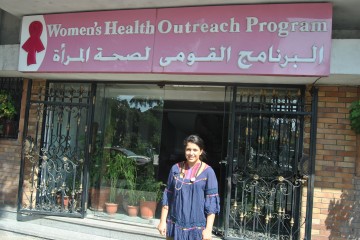A personal blog by Sara Eftekhar (UBC Nursing Student)
Egypt captivated the world on January 25, 2011, marking a day for its revolution and ending a thirty year rule. I spent about two months volunteering at a public hospital in Cairo and from my point of view, the scars after the uprising continued to be present in the social fabric of everyday life in Egyptian society. Tahrir Square, the symbolic heart of Egypt’s struggle for change remained with images of democracy and political slogans painted on the walls in the heart of the activist community. The first democratic elections of Egypt had occurred two months prior to my arrival with the newly elected Muslim Brotherhood President; Mohammed Morsi. My first observation of Egypt was that the country’s troubled transition to democracy had caused even a greater confusion amongst its people. Some individuals who fought and struggled for freedom felt that the revolution had not lived up to its full potential.
Many patients and health care workers at this hospital expressed to me that they were disappointed in the lack of structure in society after the revolution; there was no constitution in place, no parliament, no security and therefore no order. Many people including health care workers stopped providing services to people because there was no consequence or punishment for them. Policies and laws to protect patients were not always followed and many families became angry about the situation which caused a lot of tensions and fights in the hospital. I distinctively remember a surgery being resumed in the hospital due to a lack of supplies; not because the supplies did not exist but because no order was made and the shipment company just stopped providing services. The political and social instability in the country had caused numerous challenges on many fronts such as a lack of economic resources in the public health care system. Most of the patients expressed a wide range of grievances about the stagnant economy that remained unchanged even after the revolution. It was difficult for me as a health care provider to observe how the political situation was affecting people’s health on a daily basis. I witnessed some patients begging for money outside the hospital in order to pay for their medications, pregnant mothers sleeping outside the hospital due to a lack of empty beds and many patients disclosed to me that their treatments had been delayed as a result of many hospitals closing during the period of the revolution.
Despite the hardships during these times of transition, some continued to look at their country with optimism and were striving to make their country better. A noteworthy establishment was the Women’s Health Outreach program which is primarily focusing on improving women’s health. Currently, they are establishing and running mobile clinics throughout Cairo, awareness campaigns as well as prevention and early detection clinic days which touch on various aspects of women’s health. Although, many of their goals and projects were delayed due to the revolution, the health care workers running the clinic on a voluntary basis are signs of hope in the midst of post revolution chaos.
The aftermath of the Egyptian revolution left its mark on people’s health and the health care system. Many people believe that these negative impacts of the revolution are temporary under the country’s new transition and some celebrating the revolution look at the gains achieved in the past year with confidence that the country is moving in the right direction. I hope that I will be able to go back again one day to examine all of the changes that will occur in the country.
~ Sara Eftekhar
